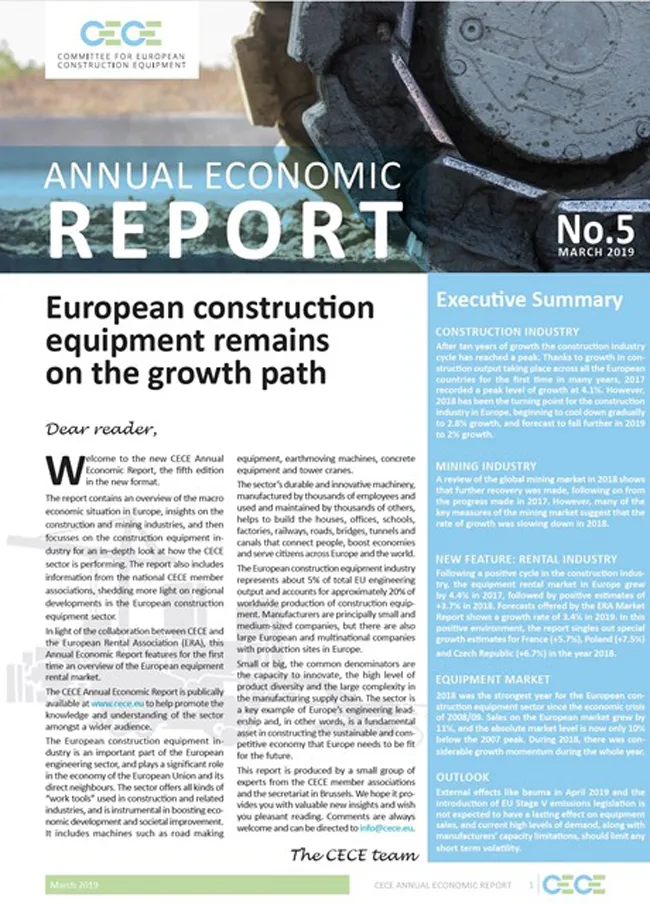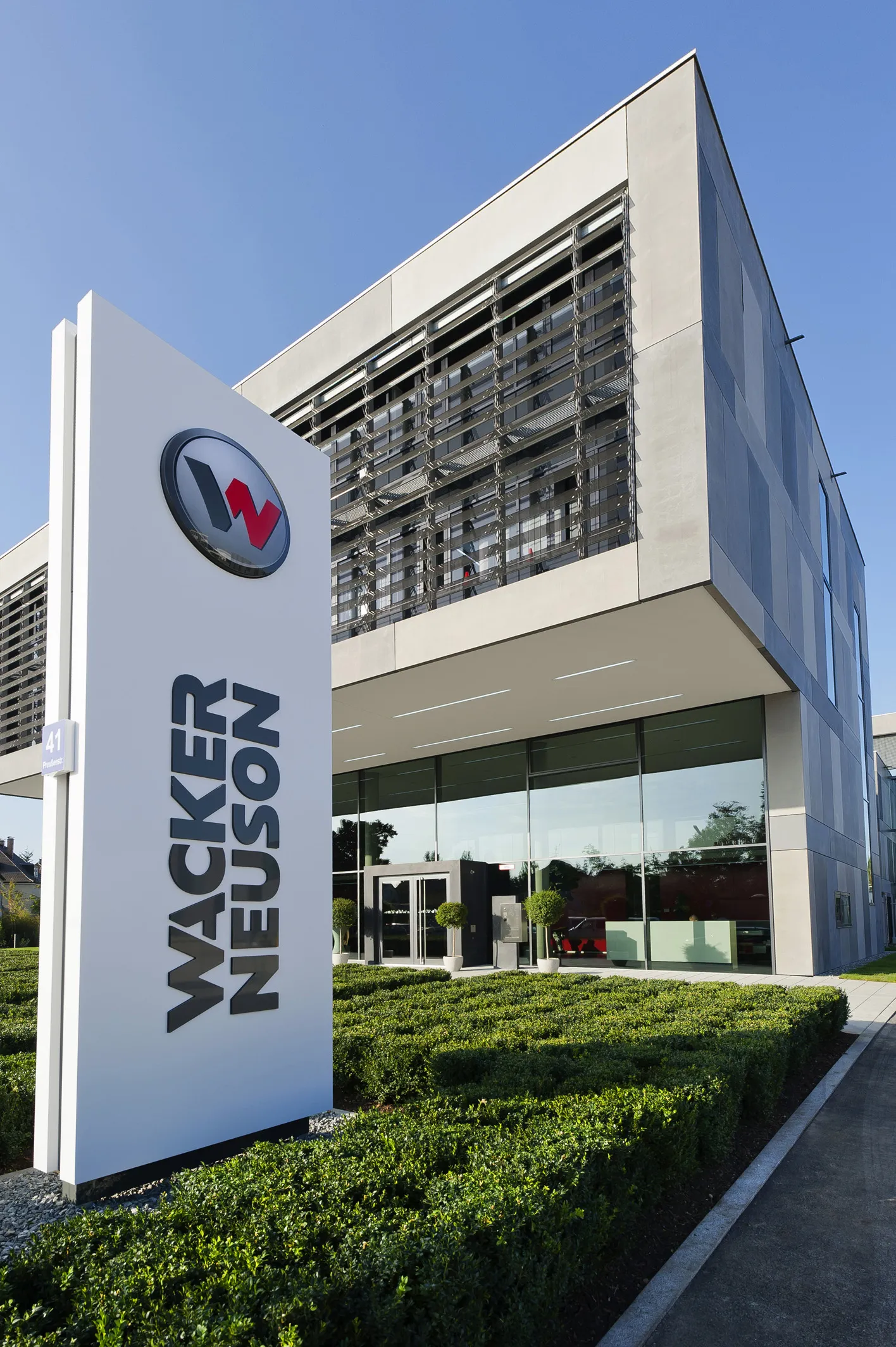German manufacturers of construction equipment reported an 8% rise in sales, amounting to €8.4 billion. The level was higher than expected and equal to sales in 2006, according to the Construction Equipment and Building Material Machinery Association (VDMA). However, the VDMA, part of the German Engineering Federation, suggested that company profits may not have risen along with sales and tough times remain ahead. “Turnover is one thing, profit is another,” Joachim Strobel, deputy chairman of VDMA, said.
February 18, 2015
Read time: 3 mins

German manufacturers of construction equipment reported an 8% rise in sales, amounting to €8.4 billion.
The level was higher than expected and equal to sales in 2006, according to the Construction Equipment and Building Material Machinery Association (1331 VDMA).
However, the VDMA, part of the German Engineering Federation, suggested that company profits may not have risen along with sales and tough times remain ahead. “Turnover is one thing, profit is another,” Joachim Strobel, deputy chairman of VDMA, said.
Orders were 7% higher than in the previous year, due mainly to good demand in earth moving and road construction equipment markets, he explained. Large equipment has sold much less, mainly due to the difficult situation of the global mining industry, he said. The building construction machinery area is recovering rather slowly and is still 50% lower in turnover today than in the boom years.
The highest demand for German equipment across Europe was for road building machinery, although there are questions over the strength of the French market. There were no investments being made in this, the second most important European market – “a hard blow for many a company”, according to Strobel.
In addition, construction equipment rental companies are not showing any sign of wanting to invest in new machinery. Strobel said these companies are still trying to position themselves with regard to exhaust emission levels IIIA, IIIB and those to come.
A lack of sales in Russia has been distressing for many companies, with sales tumbling by 37% on 2013. This could remain the situation due to the ongoing political tensions the west has with Russia.
But business with the US continues to rise sharply, partly due to helpful currency exchange rates. Sales were up 19% on 2013. Sales were healthy in the Middle East and northern Africa, especially Saudi Arabia.
In contrast, the BRIC countries – Brazil, Russia, India, China -- did not fulfill their promise. In China, the industry has had to cope with the third consecutive double-digit decline. No sign appears of a reversal this year because surplus machinery in China will dampen sales
In India, the construction industry’s mood has improved, but as yet this has not translated into more sales. South America, as well as the African continent, is behind expectations. Only Egypt provides a boost coming on back of expansion of the Suez Canal.
In 2015, many manufacturers of construction equipment will again have to invest heavily in order to implement the European exhaust emission levels as required by 97/88/EC. Currently the regulations are being reviewed.
Strobel said the so-called level V prescribes new limits which are “doable” and discussions continue about the deadlines to implement these new regulations. He said it may too ambitious to have a deadline of January 1, 2020, for mobile machinery comprising the categories from 56-130 kW, as well as January 1, 2019, for all other machines in all categories.
“With development periods being five years and in light of the technical developments required, these deadlines are far too tight,” he said. The industry is fighting in Brussels to push back the deadlines. Since the regulations were first introduced in 1999, mobile machinery’s emissions have already been decreased by more than 95% for NOx and PM.
The level was higher than expected and equal to sales in 2006, according to the Construction Equipment and Building Material Machinery Association (
However, the VDMA, part of the German Engineering Federation, suggested that company profits may not have risen along with sales and tough times remain ahead. “Turnover is one thing, profit is another,” Joachim Strobel, deputy chairman of VDMA, said.
Orders were 7% higher than in the previous year, due mainly to good demand in earth moving and road construction equipment markets, he explained. Large equipment has sold much less, mainly due to the difficult situation of the global mining industry, he said. The building construction machinery area is recovering rather slowly and is still 50% lower in turnover today than in the boom years.
The highest demand for German equipment across Europe was for road building machinery, although there are questions over the strength of the French market. There were no investments being made in this, the second most important European market – “a hard blow for many a company”, according to Strobel.
In addition, construction equipment rental companies are not showing any sign of wanting to invest in new machinery. Strobel said these companies are still trying to position themselves with regard to exhaust emission levels IIIA, IIIB and those to come.
A lack of sales in Russia has been distressing for many companies, with sales tumbling by 37% on 2013. This could remain the situation due to the ongoing political tensions the west has with Russia.
But business with the US continues to rise sharply, partly due to helpful currency exchange rates. Sales were up 19% on 2013. Sales were healthy in the Middle East and northern Africa, especially Saudi Arabia.
In contrast, the BRIC countries – Brazil, Russia, India, China -- did not fulfill their promise. In China, the industry has had to cope with the third consecutive double-digit decline. No sign appears of a reversal this year because surplus machinery in China will dampen sales
In India, the construction industry’s mood has improved, but as yet this has not translated into more sales. South America, as well as the African continent, is behind expectations. Only Egypt provides a boost coming on back of expansion of the Suez Canal.
In 2015, many manufacturers of construction equipment will again have to invest heavily in order to implement the European exhaust emission levels as required by 97/88/EC. Currently the regulations are being reviewed.
Strobel said the so-called level V prescribes new limits which are “doable” and discussions continue about the deadlines to implement these new regulations. He said it may too ambitious to have a deadline of January 1, 2020, for mobile machinery comprising the categories from 56-130 kW, as well as January 1, 2019, for all other machines in all categories.
“With development periods being five years and in light of the technical developments required, these deadlines are far too tight,” he said. The industry is fighting in Brussels to push back the deadlines. Since the regulations were first introduced in 1999, mobile machinery’s emissions have already been decreased by more than 95% for NOx and PM.








